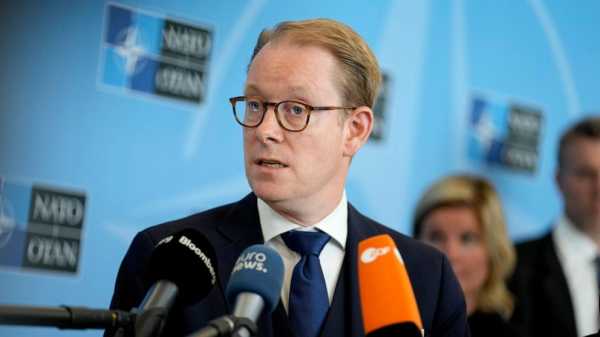
VILNIUS, Lithuania — Turkish President Recep Tayyip Erdogan on Monday introduced a new condition for approving Sweden’s membership in NATO, calling on European countries to “open the way” for Turkey to join the European Union.
The surprise announcement by Erdogan before departing for a NATO summit in Lithuania’s capital added new uncertainty to Sweden's bid to become the alliance's 32nd member, which Turkey initially blocked by saying Sweden was too soft on Kurdish militants and other groups that Ankara considers security threats.
It was the first time that Erdogan linked his country's ambition to join the EU with Sweden's efforts to become a NATO member.
“Turkey has been waiting at the door of the European Union for over 50 years now, and almost all of the NATO member countries are now members of the European Union,” Erdogan told reporters in Istanbul. “I am making this call to these countries that have kept Turkey waiting at the gates of the European Union for more than 50 years.”
“Come and open the way for Turkey’s membership in the European Union. When you pave the way for Turkey, we’ll pave the way for Sweden as we did for Finland,” he added.
Earlier, Erdogan's office said he told U.S. President Joe Biden during a telephone call Sunday that Turkey wanted a “clear and strong” message of support for Turkey’s EU ambitions from the NATO leaders meeting in Vilnius. The White House readout of the Biden-Erdogan call did not mention the issue of Turkish membership in the EU.
Erdogan and Swedish Prime Minister Ulf Kristersson met later Monday as they arrived in Vilnius, where NATO leaders are to meet over the next two days to discuss a host of issues including NATO's future relations with Ukraine.
Asked about Erdogan’s comments, NATO Secretary-General Jens Stoltenberg said he supports Turkey’s ambition to join the EU but noted that it wasn’t among the conditions listed in an agreement that Sweden, Finland and Turkey signed at last year’s NATO summit in Madrid.
Stoltenberg reiterated that Sweden had met those conditions and said he thinks it is “still possible to have a positive decision” on the country's pending membership during this week's summit in Lithuania.
EU Commission spokesperson Dana Spinant said that “you cannot link the two processes in regards to Turkey.”
Turkey is a candidate to join the EU, but democratic backsliding during Erdogan's presidency, disputes with EU-member Cyprus and other issues have held up the country's progress toward admission in the 27-nation bloc.
However, as a member of NATO, Erdogan's government has postponed ratifying Sweden’s accession to the alliance, saying the administration in Stockholm needs to do more to crack down on Kurdish militants and other groups. A series of anti-Turkey and anti-Islam protests in Sweden's capital raised doubts that an agreement to satisfy Turkey's demands could be reached before the NATO summit.
Turkey's delays on Sweden's accession have irritated other NATO allies including the United States. Biden's national security adviser, Jake Sullivan, confirmed Sunday that Biden and Erdogan had spoken earlier that day about Sweden's NATO membership among other issues and had agreed to meet in Vilnius for further talks. Sullivan didn't mention the EU membership issue.
He said the White House is confident Sweden will join the alliance.
“If it happens after Vilnius — we’re confident it will happen,” he said. “We don’t regard this as something that is fundamentally in doubt. This is a matter of timing. The sooner the better.”
Erdogan's latest comments stunned seasoned Turkey analysts.
“Erdogan has introduced new demands and moved the target repeatedly throughout this process, but trying to put pressure on the EU over a NATO matter is rather spectacular,” said Paul Levin, director of the Institute for Turkish Studies at Stockholm University.
“However, I think that we should interpret his remarks with caution for now. They could signal everything from setting the stage for a face-saving OK to Sweden, to an attempt to sabotage the NATO enlargement process by raising impossible demands,” Levin added. “What can be said is that if he were to actually condition Swedish NATO accession on a reboot of the Turkish EU accession process, then Sweden is unlikely to become a NATO ally anytime soon.”
Before Erdogan's comments, Swedish Foreign Minister Tobias Billström expressed optimism that Turkey would drop its objections to Stockholm's NATO bid.
“What we are counting on, of course, is to reach a point where we get a message back from President Erdogan that there will be what you might call a green light … a message that the ratification process in the Turkish Parliament can start,” Billström told Swedish broadcaster SVT.
He insisted Sweden has fulfilled its part of the deal with Finland and Turkey, which included lifting arms embargoes on Turkey, tightening anti-terror laws and stepping up efforts to prevent the activities of the outlawed Kurdistan Workers' Party, or PKK, which has waged an insurgency in Turkey since the 1980s.
“We should consider it as a settled question in the sense that it is not a question of if. In connection with the NATO summit in Madrid last year, Turkey already gave Sweden status as an invitee to NATO. It is therefore a question of when," he said.
Billström said he expected Hungary, which also hasn't ratified Sweden's accession, to do so before Turkey.
Previously non-aligned Sweden and Finland applied for NATO membership last year following Russia's invasion of Ukraine. Finland joined in April following Turkish ratification.
Another key issue in Vilnius will be how to bring Ukraine closer to NATO without actually joining, and security guarantees Kyiv might need to ensure that Russia doesn’t invade again after the war ends. Stoltenberg said the most important thing was to continue to support Ukraine’s efforts to resist the Russian invasion.
“Unless Ukraine prevails there is no membership issue to discuss at all," he said.
___
Fraser reported from Ankara, Turkey. AP White House reporter Chris Megerian in London contributed to this report.
Sourse: abcnews.go.com






